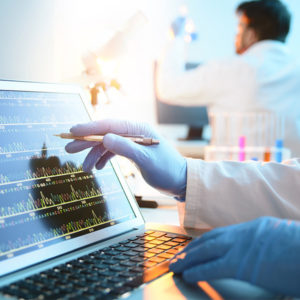Bacterial Genomes: From DNA to Protein Function Using Bioinformatics
11 June–7 September 2018
FutureLearn platform, online
Use bioinformatics to explore DNA sequences and protein functions, to find the determinants of virulence in microbes.
Overview
- Duration: 2 weeks, 5 hours per week
- Free
- Certificate of Achievement available on satisfactory completion
- CPD Approval: Royal College of Pathologists (10 credits)
- Start Date: The course is run ‘live’ for 2 weeks from the start date above. Once this period is over there will be no live monitoring of the forums, but you can still join and complete the course during the remaining period.
Why join the course?
Join us in our quest to discover what makes microbes dangerous. Use bioinformatics to probe genomes, to explore and represent DNA and protein sequences. Then, use databases to find protein sequences’ conserved domains and investigate their functions.
Who is the course for?
The course will be of interest to undergraduates, post-graduates, researchers, bioinformaticians, biomedical researchers, microbiologists, healthcare professionals and all those who are interested in learning about the underlying mechanisms of bacterial disease, DNA sequences and protein data, or how to use online analytical tools to probe genomes.
The topics covered in this course are applicable to the genomes of all organisms. It is not essential to have previous knowledge or experience in bioinformatics. Scientific terminology is explained. The opportunity to use online computational tools in the context of bacterial genomes will also be of interest to teachers and their 16-18-year-old science and computing students.
What do people say about this course?
“Clear introduction of the – often viewed as complex – field of bioinformatics.”
Mqondisi Tshabalala, PhD student, Institute for Cellular and Molecular Medicine, University of Pretoria, South Africa
“Highlights of the course were the investigations with the databases – these reinforced the learning.”
Dr. Alan McLintic, Anaesthesiologist, Faculty of Medicine and Health Scientists, University of Auckland, New Zealand
Programme
Course start dates
This course is repeated twice a year.
Next start dates:
- December 2018 (date TBC)
- June 2019 (date TBC)
What topics will you cover?
- Bioinformatics tools, DNA and protein sequences
- Retrieving DNA and protein sequences from repositories
- Databases for protein annotation
- Inferring function from sequence
What will you achieve?
By the end of the course, you’ll be able to…
- assess DNA representations and protein sequences
- perform searches in primary databases (repositories) and retrieve gene/protein data
- interpret different repository submission formats
- investigate biological databases for research
- identify the putative function of proteins based on their conserved domains
Educators
Lead Educators
Dr Anna Protasio
I am a researcher in parasitology and life sciences. I am passionate about bioinformatics and how we can use these tools to answer questions in biology.
Martin Aslett
I am the IT Manager for the Wellcome Genome Campus Advanced Courses and Scientific Conferences team. My interests lie in bioinformatics and its application to microbial genomics.
Dr Christine Boinett
I am a researcher in bacterial genetics and my interest is in understanding the development of resistance in bacterial pathogens using next generation sequencing techniques.
Educator
Matthew Dorman
I am a graduate student at the Wellcome Sanger Institute, where I research the virulence and the molecular genetics of bacterial pathogens as part of the Infection Genomics programme.
Programme Lead Educator
Professor Nicholas Thomson
Group Leader at the Wellcome Sanger Institute, interested in bacterial evolution and the spread of infectious disease; provides scientific oversight for this course.
The course also features interviews with two distinguished experts:
Dr Rob Finn
Team Leader of EMBL-EBI Sequence Families Team
Dr Claire Chewapreecha
Sir Henry Wellcome Fellow and Lecturer, University of Cambridge, UK, and King Mongkut University of Technology, Thailand.
What's included
Wellcome Genome Campus Advanced Courses and Scientific Conferences are offering everyone who joins this course a free digital upgrade, so that you can experience the full benefits of studying online for free. This means that you get:
- Unlimited access to this course
- Includes any articles, videos, peer reviews and quizzes
- Tests to validate your learning
- A PDF Certificate of Achievement to prove your success when you’re eligible

